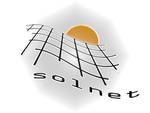Advanced solar heating and cooling for building s
s
2006 – 2010
FP6 Marie Curie Actions – Human Resources and Mobility Project for Early Stage Training
Starting in June 2006, the European Union supported a PhD-network on Advanced solar heating and cooling for buildings (SOLNET). The network consisted of nine university research groups from seven different European countries and several commercial enterprises, working in the fields of civil, mechanical, and environmental engineering, as well as architecture. The program is coordinated by Kassel University, Germany. Ten students receive scholarships and are preparing PhD-thesis in the framework of Solnet. The common scope of the research activities is to contribute to the foundations for a new generation of solar heating and cooling systems with high solar fraction. The project finished in 2010.
Participating universities:
Kassel University (Germany), TU Lyngby (Denmark), Lund University (Sweden), Högskolan Dalarna (Sweden), University of Applied Science, Stuttgart (Germany), Czech Technical Univerisity in Prague (Czech Republic), Graz Technical University (Austria), Politecnico di Milano (Italy), Lleida University (Spain)
General description
SOLNET was the first coordinated international PhD education program on Solar Thermal Engineering:
European expert knowledge and experience in the education field was brought together.
Biannual courses were offered to the network students and other PhD students working in the field.
10 PhD projects were started in 2006 and 2007 in the field of solar thermal energy; each PhD scholarship had a duration of 3 years
PhD students already active in this field were involved in the SOLNET research and training activities as well.
Course material developed were made generally accessible.
The SOLNET consortium consists of nine university research groups from seven different European countries and involves six commercial enterprises as secondment hosts. The research is carried out in the fields of civil, mechanical, and environmental engineering, as well as architecture. In the framework of the EST project ten coordinated PhD-projects are carried out. The common scope of the network research activities is to lay the foundations for a new generation of cost-efficient solar heating systems and of combined solar heating and cooling systems.
Course topics and PhD topics were chosen to cover all the relevant fields:
The courses covered system components, innovative materials, system evaluations and optimisation strategies, the overall energy situation in Europe, societal issues and they convey complementary skills. The overall research training project was monitored during project meetings having taken place in the framework of the bi-annual course modules, with student presentations, forums, and project discussions. In annual plenary network meetings, supervisors as well as PhD students and external experts evaluated results of the ongoing research and the network activities.
The SOLNET consortium organized seven PhD courses during the four-year period of the EST project. The courses had more or less the same structure, but dealt with different aspects: solar energy components, materials, systems and applications. The training program was supplemented by accompanying courses held at the EuroSun Conferences, computer courses, and non-technical complementary training. PhD students from outside the SOLNET project were encouraged to participate in the seven PhD courses in order to increase networking potential and to open up for new collaborative possibilities. The course modules are listed below.
M1 SERC, Sweden – Dynamic System simulations using TRNSYS and other simulation programs: Development of network program & joint subsystems.
M2 TU Graz, Austria – System integration of solar thermal plants: Components, guidelines, characterization, analysis of applications, hydraulics, control systems, dimensioning and optimisation, design exercise and an excursion to built examples.
M3 DTU, Denmark – Thermal stratification in solar heat storage tanks: Importance, establishment, maintenance, modelling, experimental investigation
M4 HfT/POLIMI, Italy – Solar cooling: Cooling load calculations, impact on system design, on thermodynamics and planning issues of open sorption, absorption and adsorption cooling systems
M5 Uni-Lleida, Spain – Design and simulation of PCM (phase change material) applications to low energy-buildings: Material properties, heat transfer analysis, micro- and macro encapsulation of PCMs, passive and active applications, TRNSYS modelling
M6 CTU/Uni-Lund, Czech Republic – Advanced solar collectors: Flat plate & concentrating, liquid & air collectors, optical properties, selective coatings, non-tracking systems, dynamic characterization, integration into the building envelope, hybrid solar air-water and PV-thermal collectors, numerical models
M7 Uni Kassel, Germany – Renewable energy and energy efficiency: Technologies, energy economics, global environmental situation, resources, energy transformation, rational energy utilization, and electrification in rural areas